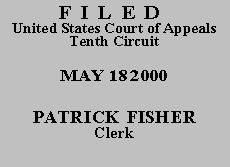

| UNITED STATES OF AMERICA,
Plaintiff-Appellee, |
|
| v. | |
| ROBERT DURFEE,
Defendant-Appellant. |
|
Robert Durfee appeals the district court's order revoking his supervised release and sentencing him to ten months in prison followed by four years of supervised release. We exercise jurisdiction pursuant to 18 U.S.C. § 3742(a) and affirm.
Durfee pleaded guilty to manufacturing methamphetamine during March 1990, in violation of 21 U.S.C. § 841(a)(1). On August 10, 1990, he was sentenced to 84 months in prison followed by 8 years of supervised release. He began serving his supervised release on May 31, 1996. On July 7, 1999, the district court revoked Durfee's supervised release for failure to participate in a drug program as directed by his probation officer and sentenced him to ten months in prison followed by four years of supervised release.
On September 13, 1994, Congress enacted 18 U.S.C. § 3583(h), which provides:
When a term of supervised release is revoked and the defendant is required to serve a term of imprisonment that is less than the maximum term of imprisonment authorized under subsection (e)(3), the court may include a requirement that the defendant be placed on a term of supervised release after imprisonment. The length of such a term of supervised release shall not exceed the term of supervised release authorized by statute for the offense that resulted in the original term of supervised release, less any term of imprisonment that was imposed upon revocation of supervised release.
Durfee argues that application of this section to him violates the Ex Post Facto Clause of the United States Constitution because he committed the underlying offense before the effective date of § 3583(h). The United States Supreme Court recently held that § 3583(h) is not retroactive and applies only to cases where the initial offense occurs after September 13, 1994. Johnson v. United States, 2000 WL 574359 (May 15, 2000). Therefore, § 3583(h) does not apply to Durfee's July 7, 1999, sentence.
We are left then with the question of whether Durfee was illegally sentenced. In Johnson, the Court looked at whether the version of 18 U.S.C. § 3583(e)(3) in effect at the time of the initial offense permitted imposition of supervised release following reincarceration. At the time Durfee committed his original offense in March 1990, § 3583(e)(3) authorized the district court to
revoke a term of supervised release, and require the person to serve in prison all or part of the term of supervised release without credit for time previously served on postrelease supervision, if it finds by a preponderance of the evidence that the person violated a condition of supervised release . . . except that a person whose term is revoked under this paragraph may not be required to serve more than 3 years in prison if the offense for which the person was convicted was a Class B felony, or more than 2 years in prison if the offense was a Class C or D felony.
The Johnson Court concluded that Congress intended § 3583(e)(3) to allow imposition of further supervised release:
The proceeding that follows a violation of the conditions of supervised release is not, to be sure, a precise reenactment of the initial sentencing. Section 3583(e)(3) limits the possible prison term to the duration of the term of supervised release originally imposed. . . . The new prison term is limited further according to the gravity of the original offense. See § 3583(e)(3). But nothing in these specific provisions suggests that the possibility of supervised release following imprisonment was meant to be eliminated.
Johnson, 2000 WL 574359 *9. The district court did not err in imposing a prison sentence followed by a period of supervised release upon the revocation of Durfee's supervised release.
The judgment of the district court is AFFIRMED.
Entered for the Court
Mary Beck Briscoe
Circuit Judge
*.This order and judgment is not binding precedent, except under the doctrines of law of the case, res judicata, and collateral estoppel. The court generally disfavors the citation of orders and judgments; nevertheless, an order and judgment may be cited under the terms and conditions of 10th Cir. R. 36.3.